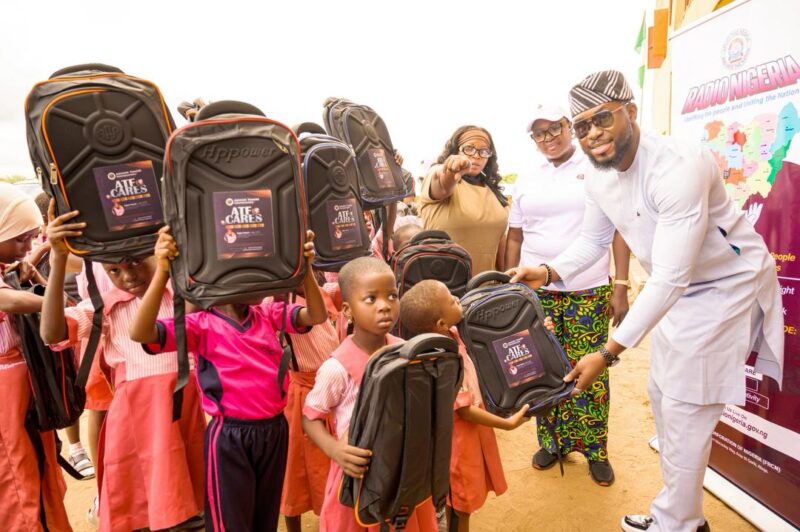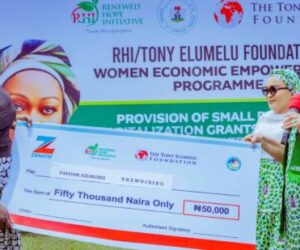2

TOYIN ADEBAYO
ABUJA – In the narrow streets of Ejigbo, where the sounds of school bells blend with the hum of street traders, nine-year-old Tobi Aina clutched his new school bag like a treasure chest. His face lit up with the pure, unfiltered joy of a child who had just received something precious, not just a bag, but a renewed reason to believe in his education.
“It’s the first time I’m having my own backpack,” he said shyly, his eyes darting toward his mother, a petty trader who earns barely enough to feed her three children. “I will take care of it very well. I want to become a teacher one day.”
For many parents in Lagos’ densely populated Oshodi-Isolo Constituency II, stories like Tobi’s are heartbreakingly familiar. Rising costs of living have made it increasingly difficult for families to afford even the most basic school materials exercise books, pens, or uniforms. As the new academic session began, anxiety rather than excitement filled many homes.
But this September, something changed.
The Abosede Tomori Foundation (ATF) a young but fast-growing community initiative, brought smiles back to classrooms in the area. Through its “Back to School” intervention, the foundation distributed school bags, notebooks, pens, pencils, water bottles, and other essential learning items to over 300 indigent pupils across five public primary schools in Ejigbo and Isolo Local Council Development Areas (LCDAs).
For children like Tobi, it was more than charity; it was dignity restored.
The beneficiary schools, Oladele Alake Primary School, Low Cost Housing Estate Primary Schools 1 and 2, Ansar Ud Deen (AUD) Nursery & Primary School, Isolo, and Ajao Estate Primary School, buzzed with excitement as volunteers and teachers gathered under tents to welcome guests from the Foundation.
The atmosphere was festive but also deeply emotional. For many teachers, the gesture felt like an answered prayer.
At Low Cost Housing Estate Primary School 2, Headteacher Mrs Adebayo Funmilayo could barely contain her gratitude. “You may not understand what this means to us,” she said, her voice trembling slightly. “Some of our pupils come to school without even a notebook. Parents promise to buy later, but they hardly can. Seeing them receive these items today, it’s hope reborn.”
Children beamed as they showed off their new items, comparing bag colours and flipping through the clean pages of their new notebooks. To them, this was a celebration of worth, a moment that said, “You matter.”
For Segun Tomori, Founder of the Abosede Tomori Foundation and Special Assistant on Media to the Minister of Solid Minerals Development, this initiative is deeply personal. He grew up seeing children drop out of school for reasons as simple as not having a pen or an exercise book.
“This ‘Back to School’ outreach was designed to assist less-privileged pupils with basic learning materials and reduce the financial burden on their parents as the new academic session kicks off,” Tomori said during the event.
“The Schools Intervention Programme (SIP) remains a core pillar of our foundation’s mission. We want to make sure that every child, no matter their background, has a fair chance to learn in a safe and conducive environment.”
Tomori’s words reflected both compassion and conviction. He engaged headteachers, spoke with parents, and pledged further interventions, particularly in school infrastructure, to improve the quality of learning spaces.
“We are committed to leveraging our network and influence at the federal level not just to give back, but to drive meaningful change at the grassroots,” he added. “Supporting education remains one of our top priorities.”
The Abosede Tomori Foundation was launched in July 2025, named in honour of Tomori’s late mother, Mrs. Abosede Tomori, who was known for her generosity and lifelong commitment to helping others.
True to her legacy, the foundation’s work spans education, healthcare, economic empowerment, and community welfare.
In its short existence, the Foundation has already touched hundreds of lives. At its launch, it organised a health outreach that provided free medical care to more than 250 residents, facilitated n50,000 cash grants to 50 small and micro business owners, and distributed food packs to over 150 families struggling under economic hardship.
According to Tomori, these efforts are only the beginning.
“Our goal is to build a sustainable model for community transformation, one that meets immediate needs but also empowers people to stand on their own. Whether it’s through healthcare, education, or entrepreneurship, our focus is people,” he explained.
At Ansar Ud Deen Nursery and Primary School, Isolo, a young teacher, Miss Rukayat Bello, watched as her pupils excitedly unpacked their new school materials. “When a child feels seen, they perform better,” she said thoughtfully. “Sometimes, what they need is not just teaching but encouragement, a simple act that tells them, ‘You are worth investing in.’ That’s what the Tomori Foundation has done.”
She narrated how one of her pupils, a seven-year-old girl named Aisha, had stopped attending school for a week because her only pair of sandals broke. “Her mother sells vegetables; she just couldn’t afford to replace them,” Bello recalled. “Today, she came back because she heard she would get a school bag and books. That’s the kind of impact we are seeing.”
For parents, the relief was palpable. Mrs. Ifeoma Nwankwo, mother of two, wiped away tears as she spoke. “I was worried about how to buy books this term. Everything is expensive. When I got the message from my child’s school that there would be a foundation helping us, I thought it was a joke. But today, I’m thankful. This shows that people still care.”
Experts agree that interventions like this play a critical role in bridging Nigeria’s widening education gap. According to UNICEF, more than 10 million Nigerian children remain out of school, with economic hardship cited as a major barrier. In Lagos alone, thousands of children attend public schools under conditions that make learning a daily struggle.
For communities like Ejigbo and Isolo, where public schools are overcrowded and underfunded, private philanthropy often fills a critical gap.
Dr. Adewale Olayinka, an education policy analyst, noted that the ATF’s intervention, though localised, represents a scalable model of community-based impact.
“When citizens and private actors take ownership of education at the grassroots, the entire ecosystem benefits. What the Tomori Foundation is doing is not just giving bags, it’s reinforcing the social contract that every child deserves a fair start,” he said.
Tomori says the Foundation is already planning the next phase of its education-focused programmes. Beyond distributing materials, it aims to embark on school infrastructure upgrades, teacher support initiatives, and scholarship schemes for exceptional students from low-income families.
“We want to adopt some schools in the constituency and work with government agencies to rehabilitate classrooms, improve sanitation, and provide learning aids,” he explained.
“We’re also exploring mentorship programmes where professionals can inspire pupils to dream beyond their current realities.”
To sustain its projects, the Foundation is building partnerships with local and international donors, private sector players, and government agencies. “It’s not about doing everything alone,” Tomori noted. “It’s about building a network of hope.”
When asked what drives him, Tomori smiled. “It’s the people I grew up with, my neighbours, my classmates, the market women who contributed to our school fees when times were tough. Those experiences shaped me. Giving back is not an obligation; it’s gratitude in action.”
He believes that every public official or professional who has found success owes a duty to their roots. “If each of us gives just a little back to where we come from, our communities will thrive again,” he said.
For him, the Abosede Tomori Foundation is more than a charity; it is a living tribute to his mother’s spirit and a vehicle for change that connects compassion with action.
In the days following the outreach, social media was flooded with photos and videos from the event, pupils smiling with new bags, teachers expressing appreciation, and community leaders calling for more partnerships.
Chairman of Ejigbo LCDA, Hon. Monsuru Bello, who was represented at one of the distribution ceremonies, commended the Foundation’s initiative. “What Segun Tomori is doing is what true leadership means, not waiting for government alone but taking personal responsibility to uplift your people,” he said.
Similarly, community development associations and youth groups have begun reaching out to the Foundation to explore collaborations in health and skills acquisition.
As the sun set over the school compound that day, the children’s laughter lingered. Some danced around their new school bags; others sat quietly, flipping through the blank pages of their exercise books, pages that now held new possibilities.
For their parents, the relief was more than material. It was emotional, a rare reminder that amidst economic hardship, kindness still walks the streets of Lagos.
Perhaps the most powerful takeaway came from a simple comment by Mrs. Adebayo, the headteacher who had earlier spoken with tears in her eyes.
“When these children succeed tomorrow,” she said softly, “they will remember that once upon a time, someone cared enough to believe in them.”
And maybe that, more than anything else, is what the Abosede Tomori Foundation stands for: the power of remembering, the courage to give, and the hope that no child should ever stop dreaming because of poverty.








